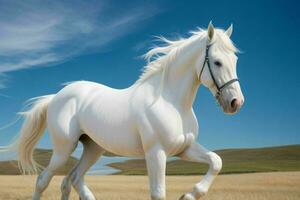Discover the ultimate horse feeding guide for new owners! Learn essential tips, feeding schedules, and nutritional requirements to keep your horse healthy. Includes a detailed feeding chart and expert advice.
Horse Feeding Guide for New Owners
Feeding horses correctly is vital for their health and performance. Understanding the basics of equine nutrition ensures your horse thrives while avoiding common health problems like colic or laminitis.
Understanding Equine Nutritional Needs
1. The Horse’s Digestive System
Horses are grazing animals with unique digestive systems designed for continuous intake of forage:
- Small stomach: Holds only 2-4 gallons, requiring small, frequent meals.
- Hindgut fermenters: Their cecum breaks down fibrous plant material through microbial fermentation.
Key Stat: Forage should make up at least 1.5-2% of a horse’s body weight daily in dry matter to maintain gut health.
2. Essential Nutrients for Horses
Horses require six primary nutrients:
- Forage (fiber): Hay or pasture is the cornerstone of a horse’s diet.
- Carbohydrates: Provide energy for work and daily activity.
- Protein: Needed for muscle development; provided by alfalfa, soybean meal, or commercial feeds.
- Fats: A concentrated energy source, particularly for performance horses.
- Vitamins: Grass and hay are rich in vitamins A, D, and E, but older hay may need supplementation.
- Minerals: Calcium and phosphorus are crucial for bone health. Ensure a balanced Ca:P ratio of 2:1.
Feeding Basics for New Horse Owners
1. Determine Your Horse’s Body Weight
Accurately estimating your horse’s weight helps calculate feeding requirements. Use a weight tape or the following formula:
Bodyweight (kg) = [Heart girth (cm)² × Length (cm)] / 11,880.
2. Forage First
Forage should always be the primary component of a horse’s diet. Options include:
- Pasture: Provides fresh forage, exercise, and vitamins. Ideal grazing time: 8-10 hours/day.
- Hay: Test hay for nutrient content. Timothy, Bermuda, and orchard grass are great choices.
Pro Tip: Feed high-quality hay to avoid mold and dust, which can cause respiratory issues.
3. Grain and Concentrates
Grains supplement energy for hard-working horses. Introduce gradually to prevent digestive upset. Popular options:
- Oats: Easily digestible and high in fiber.
- Barley: More energy-dense but less fibrous.
- Commercial Feeds: Balanced formulas designed for specific needs (e.g., senior horses, high performance).
Feeding Guidelines by Age and Activity Level
1. Maintenance Horses
- Forage-only diet is sufficient for horses with low activity levels.
- Provide clean, fresh water at all times—horses need 5-10 gallons daily.
2. Performance Horses
- Require more energy and protein.
- Use high-fat feeds or grain-based concentrates.
- Supplement electrolytes during intense work or hot climates.
3. Senior Horses
- Offer easily digestible feeds like soaked beet pulp or senior mixes.
- Ensure dental health; older horses may struggle to chew fibrous forage.
Special Considerations
1. Avoid Overfeeding
Overfeeding grains or concentrates can lead to colic, obesity, or laminitis. Divide feed into 2-3 smaller meals per day.
2. Monitor Salt Intake
Provide a free-choice salt block or mix loose salt into feed. Sodium is essential for hydration and nerve function.
3. Seasonal Adjustments
- Winter: Horses need additional forage to generate body heat.
- Summer: Ensure constant access to water and shade.
Common Mistakes to Avoid
- Skipping gradual diet changes: Sudden changes can upset gut microbes, causing colic.
- Feeding poor-quality hay: Always inspect for mold, dust, and weeds.
- Relying solely on grain: Grains should never replace forage.
Sample Feeding Chart
| Horse Type | Forage/Day (lbs) | Concentrates/Day (lbs) | Additional Notes |
|---|---|---|---|
| Maintenance Horse | 15-20 | 0-2 | Pasture and hay sufficient |
| Light Work | 20-25 | 2-4 | Add vitamin/mineral supplement |
| Moderate Work | 25-30 | 4-6 | Include electrolytes during summer |
| Senior Horse | 15-20 | 2-5 | Use senior feeds for dental issues |
For more comprehensive details on horse nutrition, consult resources like the National Research Council’s Nutrient Requirements of Horses (NRC Horse Nutrition).



